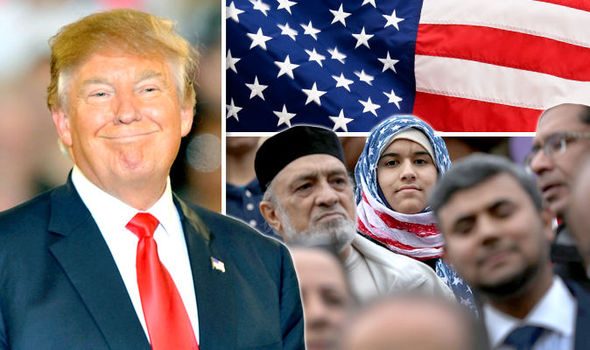
Trump’s Muslim Immigration Ban – Concerning but Likely Constitutional
February 8, 2017Archives . Authors . Blog News . Feature . Feature Img . News Stories 2014-2015 . Policy/Contributor Blogs . Professor Blogs . Recent Stories . Student Blogs ArticlePresident Trump has recently signed an executive order, titled “Protecting the Nation from Terrorist Attacks by Foreign Nationals,” that restricts visits and immigration from seven Muslim-majority countries: Iraq, Libya, Somalia, Sudan, Syria, Yemen, and Iran. Trump’s executive order has sparked widespread protest and backlash from Muslim support groups, and has routinely been characterized as “racist.” Some critics of the executive order argue that the immigration ban targeting solely Muslim-majority countries is unconstitutional. Current United States law and court cases, however, grant the President broad authority to restrict immigration from particular countries.
In the decades following the ratification of the Constitution, the Supreme Court determined that the Legislative Branch and the Executive Branch had “plenary power”—absolute power— over issues concerning immigration. Since then, Congress has given away much of its shared plenary power over immigration to the Executive Branch. For example, Congress delegated to the Executive Branch the power to determine whether foreigners should be granted temporary protected status, whether a person is permitted to work in the United States, whether a person’s deportation should be deferred, and whether to grant a person permission to be in the United States when the person does not qualify for a visa. Despite the President’s expansive decision-making power over immigration issues, however, he still may not sign executive orders that violate the Constitution.
Currently, the Supreme Court recognizes religion as a constitutionally protected class, but country of current residence is not protected to the same degree. Trump’s executive order to restrict immigration on Muslim-majority countries presents a challenging scenario because it is difficult to determine whether the executive order is targeting religion (Muslims) or targeting countries of residence (“terror states”). However, this distinction may not be consequential because the Judiciary has been extremely deferential to the Executive Branch when it makes country-based distinctions. Additionally, when the Executive Branch claims that its orders concern “national security”, the Judiciary is likely to defer to the Executive Branch. Despite the presence of certain statutory protections such as 8 U.S.C. § 1152, which forbids discrimination in visa administration because of an individual’s place of residence, as a matter of constitutionality, the Supreme Court has not yet recognized country of current residence as a distinct constitutionally protected class.
Trump’s executive order is not the first instance in which the U.S. government treated Muslim-majority countries differently. After 9/11, the Immigration and Naturalization Service, created the National Security Entry-Exit Registration System (NSEERS), which required adult males from designated countries to come into immigration offices for fingerprinting, photos, and specially designed interviews. Of the 25 designated countries, 24 of them were Muslim-majority countries. In reviewing the constitutionality of the NSEERS program, courts blindly accepted that the program was an issue of national security. They were thus required to give special deference to the Executive Branch. For example, in Kandamar v. Gonzalez, the First Circuit rejected a Moroccan’s claim that the NSEERS program unconstitutionally targeted Muslim-majority countries because national security concerns required giving deference to the Executive Branch.
Thus, while President Trump’s executive order may divide families, ruin careers and perpetuate long-standing anti-Muslim sentiments, the Supreme Court will likely find the order to be constitutional on the grounds that the Executive Branch contains plenary powers over immigration, particularly when the Executive Branch relies on national security justifications.
Suggested citation: Donovan Suh, Trump’s Muslim Immigration Ban – Concerning but Likely Constitutional, Cornell J.L. & Pub. Pol’y, The Issue Spotter, (Feb. 8, 2017), https://live-journal-of-law-and-public-policy.pantheonsite.io/trumps-muslim-immigration-ban-concerning-but-likely-constitutional/.
You may also like
- April 2024
- March 2024
- February 2024
- November 2023
- October 2023
- April 2023
- March 2023
- February 2023
- January 2023
- December 2022
- November 2022
- October 2022
- May 2022
- April 2022
- March 2022
- February 2022
- January 2022
- December 2021
- November 2021
- October 2021
- May 2021
- April 2021
- March 2021
- February 2021
- January 2021
- November 2020
- October 2020
- September 2020
- August 2020
- July 2020
- June 2020
- May 2020
- April 2020
- March 2020
- February 2020
- January 2020
- November 2019
- October 2019
- September 2019
- April 2019
- February 2019
- December 2018
- November 2018
- October 2018
- September 2018
- March 2018
- February 2018
- January 2018
- December 2017
- November 2017
- October 2017
- September 2017
- May 2017
- April 2017
- March 2017
- February 2017
- December 2016
- November 2016
- October 2016
- April 2016
- March 2016
- February 2016
- January 2016
- December 2015
- November 2015
- October 2015
- June 2015
- May 2015
- April 2015
- March 2015
- February 2015
- January 2015
- December 2014
- November 2014
- October 2014
- August 2014
- March 2014
- February 2014
- January 2014
- December 2013
- November 2013
- October 2013
- September 2013
- May 2013
- April 2013
- March 2013
- February 2013
- January 2013
- December 2012
- November 2012
- October 2012
- September 2012
- June 2012
- April 2012
- March 2012
- February 2012
- January 2012
- December 2011
- November 2011
- October 2011
- September 2011
- August 2011
- April 2011
- March 2011
- November 2010
- October 2010
- September 2010
